In our survey, 49% of “nones” say they think of themselves as spiritual or that spirituality is very important in their lives.
And 54% say they sometimes do things (like centering themselves, spending time in nature, meditating, exercising or practicing yoga) to connect with something bigger than themselves, with other people, or with their own “true self.”
The new survey also finds that most “nones” believe animals other than humans can have spirits or spiritual energies. Many also say this about cemeteries or other memorial sites, parts of nature like mountains and rivers, and certain objects like jewels or stones. And three-in-ten “nones” own things (like jewelry, crystals or a home shrine) or have body markings or piercings for spiritual purposes.
However, while many “nones” exhibit spirituality in these ways, these beliefs, practices and identities tend not to be unique to “nones.” In many cases, people who identify with a religion tend to be as spiritual or even more spiritual than “nones” in these ways.
For example, religiously affiliated adults are 30 percentage points more likely than “nones” to think of themselves as spiritual or to say spirituality is very important in their lives (79% vs. 49%). And religiously affiliated Americans are just as likely as “nones” to say they spend time centering themselves or spend time in nature in search of a connection with something bigger, other people or their own “true self.”
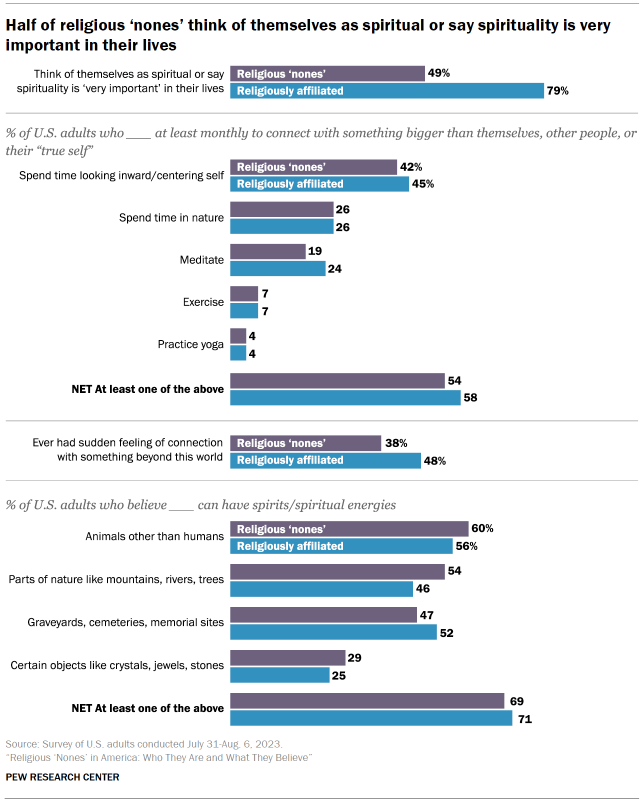
How many ‘nones’ are spiritual?
We classify about half of U.S. “nones” as spiritual because they say “yes” when asked if they think of themselves as spiritual or they say spirituality is very important in their lives.
By comparison, 79% of religiously affiliated adults are spiritual in these ways.
Among “nones,” most people who describe their religion as “nothing in particular” are spiritual. Most agnostics and atheists are not.
Most Black “nones” (72%) are spiritual, as are 55% of Hispanic “nones.” Fewer White and Asian “nones” say they are spiritual or that spirituality is very important in their lives.
“Nones” who are women are more likely than “nones” who are men to be spiritual. And more “nones” older than 50 are spiritual compared with “nones” under 30.
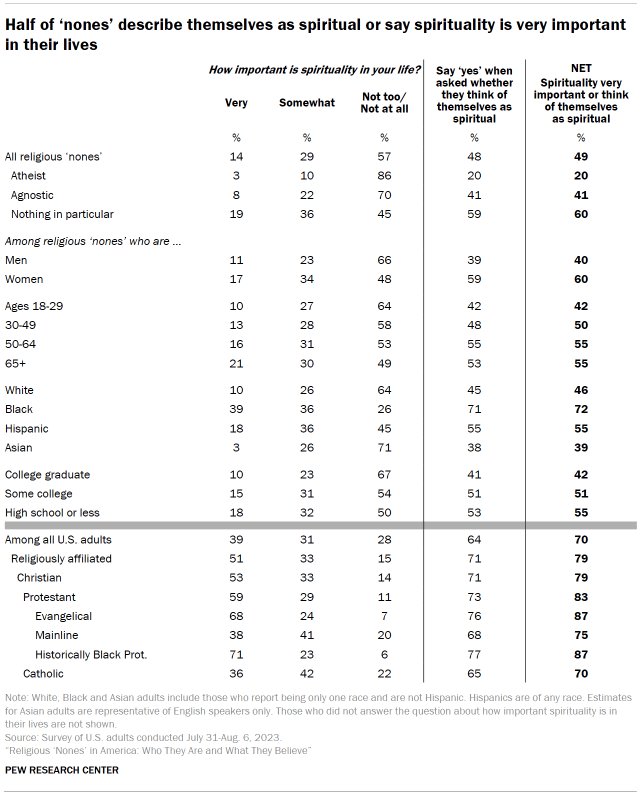
What does being ‘spiritual’ mean to ‘nones’?
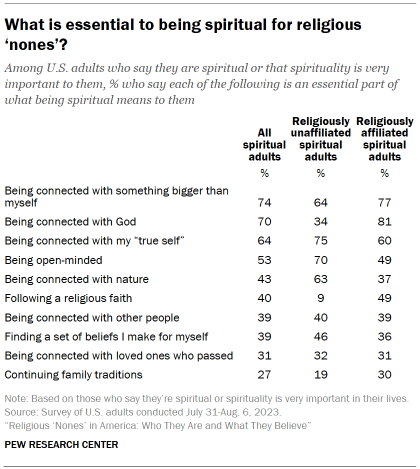
We asked all spiritual people in the survey a series of questions about what being spiritual means to them.
Whether they are “nones” or religiously affiliated, most spiritual people say being connected with something bigger than themselves is “essential” to what being spiritual means to them. Most also say this about being connected with their “true self.”
However, majorities of spiritual “nones” say being open-minded and being connected with nature are essential parts of what being spiritual means to them, while half or fewer of spiritual people who identify with a religion say this.
Most spiritual people who identify with a religion say being connected with God is essential to what being spiritual means to them, and half say following a religious faith is a core part of their spirituality. “Nones” who are spiritual are far less likely to say these things.
Connecting with something beyond or with someone who has passed away
In our survey, 38% of “nones” say they have ever experienced a “sudden or unexpected feeling of connection with something from beyond this world,” while 25% say they feel the presence of something beyond this world at least several times a year.
Additionally, 35% of “nones” say they have ever experienced a strong feeling that someone who is dead is communicating with them.
Among “nones,” these experiences are all more common for those whose religion is “nothing in particular” than for atheists and agnostics.
Feelings of connection with something beyond this world are more common among “nones” who are women than “nones” who are men, and among Black and Hispanic “nones” compared with White and Asian “nones.”
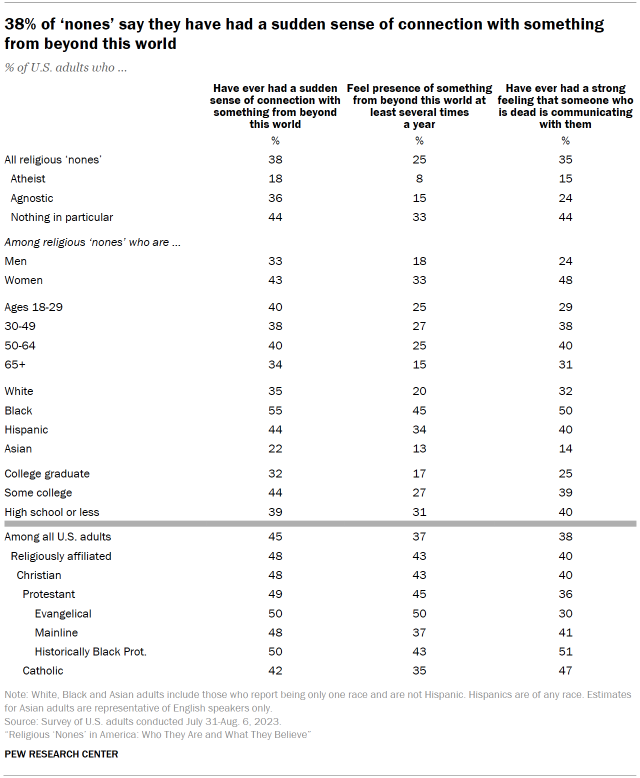
Belief that spiritual energies can be located in nature, animals, places, objects
Six-in-ten “nones” say they believe animals other than humans can have spirits or spiritual energies, while 54% say the same about parts of nature (like mountains, rivers or trees) and 47% say this about graveyards, cemeteries or other memorial sites.
Fewer “nones” say objects like crystals, jewels or stones can have spiritual energies.
Atheists are less likely than agnostics and people whose religion is “nothing in particular” to believe spiritual energies can be located in animals, parts of nature, memorial sites or objects.
And these beliefs are less common among “nones” who are men than “nones” who are women.
The survey also finds that the oldest “nones” (those older than 65) are less likely than younger “nones” to believe animals, nature, places and objects can have spirits.
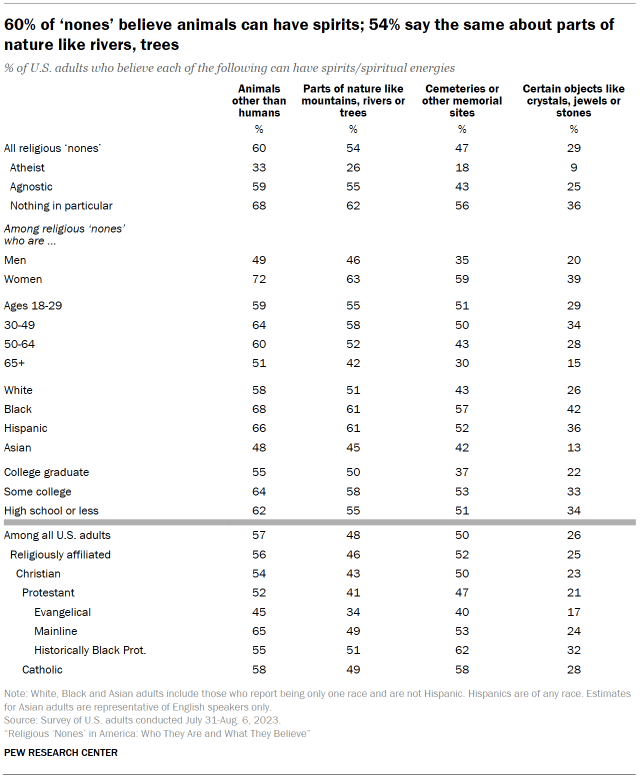
Possessions and body markings for spiritual reasons
We also asked respondents whether they have a number of things “for spiritual purposes.”
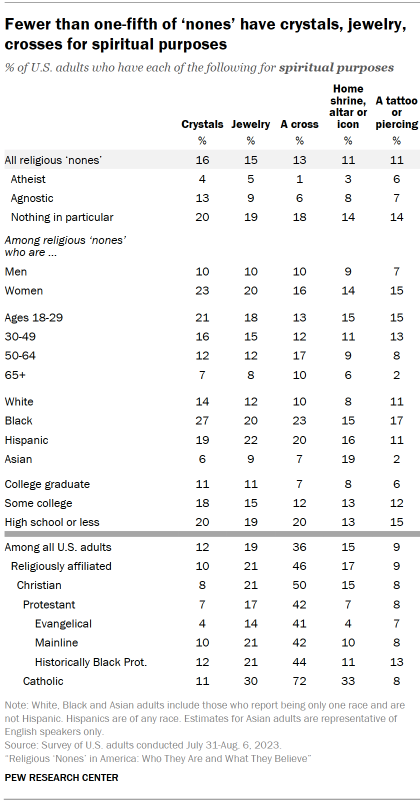
Among “nones,” 16% say they have crystals for spiritual purposes, 15% have jewelry, 13% own a cross, 11% keep a shrine, altar or icon at home, and 11% have a tattoo or piercing for spiritual purposes.
Religiously affiliated people are far more likely than “nones” to say they have a cross for spiritual purposes. Otherwise, the differences between “nones” and religiously affiliated people are fairly modest on these questions.
Return to the report’s Overview.
Find answers to other questions:
- Who are the ‘nones’? How are they defined? (Chapter 1)
- Why are ‘nones’ nonreligious? (Chapter 2)
- Are ‘nones’ less involved in civic life than people who identify with a religion? (Chapter 3)
- Are all ‘nones’ nonbelievers? (Chapter 4)
- Are ‘nones’ hostile toward religion? (Chapter 6)
- How do ‘nones’ view science? (Chapter 7)
- How do ‘nones’ think about morality? (Chapter 8)




